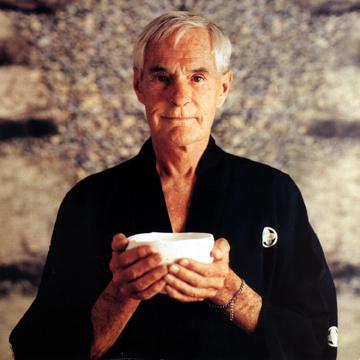 |
Remembering Timothy Leary
Jon Carroll graciously lent me his column
to publish this eulogy in The San Francisco Chronicle on May 31, 1996.
I first met Timothy Leary when I was a producer
at Activision, trying to keep up with his
wildly complex ideas about a videogame based
on cinema and interpersonal psychology. On
my first trip down to LA to work with him
he met me at the airport, striding down the
concourse dressed in white pants, a white
sweater, white sneakers and white hair, and
whisked me off in an old pea-green Mercedes
with broken seat belts. (The second time
I came down I had to call him from the airport
for directions. "Get to the Beverly
Hilton," he said, "and then you
just come whirling and swirling up the hill.")
There were always dozens of people at Tim's
house - mostly young, sometimes famous, always
burning with energy and fiercely fond of
the old man. At the end of that first hard
day's work, Tim broke some brownies out of
the freezer. "Dr. Leary," I said,
"are those, uh, marijuana brownies?"
He looked at me in mock astonishment. "I'm
Timothy Leary," he explained.
But Timothy Leary didn't die of split chromosomes,
marijuana lungs, or incurable drug-induced
insanity. He died of an old man's disease,
just plain old prostate cancer. He also drank
too much alcohol and smoked too many cigarettes.
He went to West Point, did you know that?
- and built a patio on his house in Berkeley
in the 50s with his own hands, for the kids
to play on. Eerily standard American stuff.
From his book Flashbacks I learned about the amazing energy and dedication
with which he was persecuted by nearly every
level of law enforcement, finally landing
in solitary in Folsom prison for possession
of a roach. "As I walked toward the
cell," he told me, "I knew I had
a choice - I could either have a really bad
time or I could learn something. I started
learning."
 |
|
|---|---|
| Photo From Asahi Magazine, 10/25/89 |
America will have to ask itself what it was
about Dr. Tim that was so damned scary. He
was a Berkeley Ph.D. who was one of the founders
of interpersonal psychology, and a Harvard
professor who was completely absorbed with
studying the human brain and fell into research
involving psychedelics long before they were
illegal. His transgression, in Calvinist
America, may simply have been that he stumbled
onto an instant source of illumination and
joy. These things are supposed to cost you,
bigtime, and they are supposed to come from
the Big Guy in Heaven, not the resources
of your own mind under the influence of a
plant or a chemical compound or even a spiritual
discipline, unless it is devoted to a divine
Other from whom the gift of enlightenment
flows. Although he wasn't particularly anti-Christian
(he attended Sacred Heart - did you know
that?), Dr. Tim's fundamental humanism challenged
every sort of authority, from religion to
law.
During the late 80s and early 90s Timothy
and I often found ourselves speaking at the
same conferences, usually devoted to virtual
reality or technology and culture, in places
like Barcelona, Linz (he called it "Hitler's
home town"), and Normal, Illinois. It
was heart-warming to see how his basic message
affected the kids in his audience. He sat
on the edge of the stage at the college in
Normal and in his breathy, awestruck voice
revealed the great secret: "You are
the owner and operator of your own brain."
This wasn't about acid - it was about autonomy,
agency, and the great secret that we have
within us a deep source of personal power.
After his talk in Normal some of the students
invited him back to their apartment. It was
a perfect replica of a 60s pad, complete
with black light and Hendrix poster. They
addressed him reverently. Tiring of the sedate
conversation, Tim decided that everyone should
get rowdy and dance. We whirled and swirled
around the apartment to vintage Stones. The
kids loved it. Finally he asked somebody
to pour him a drink. After some embarrassed
scrambling in the kitchen, a fellow was dispatched
to the neighbor's for a shot of Bourbon -
there wasn't a drop of booze or a speck of
marijuana in the house.
The most important thing I learned from Timothy
was tolerance. He could find something to
appreciate in anybody. He listened to everyone
who talked to him. He never treated a fan
or a student like an inferior, nor did he
fawn on celebrities. He steadfastly refused
to judge people. "Liddy's okay,"
he said when I asked him how on earth he
could go on a world speaking tour with the
man who first established himself in "law
enforcement" with the Millbrook bust.
"Liddy's intense. Liddy's Liddy."
The last time I saw Tim he was luminous.
I could feel the heat pouring off his body
as he sat a foot away, but when he reached
over and took my hand his skin was cool and
dry. "Every day is a precious jewel,"
he whispered in that awesome-secret voice.
Leary's Leary. I love you, Tim.